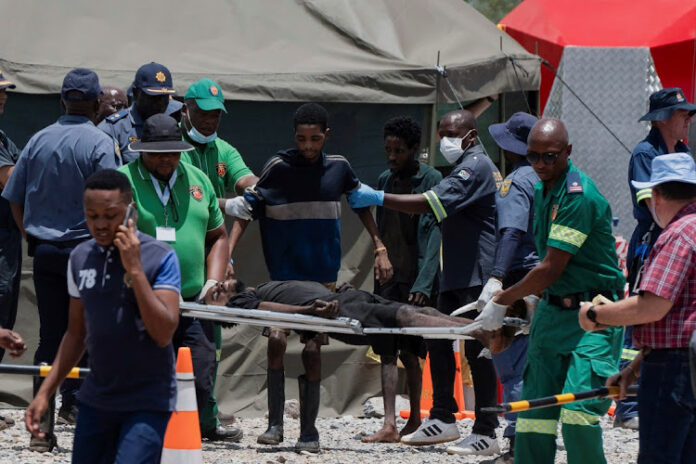The harrowing tale of Patrick, a Zama Zama who recently emerged from the depths of the abandoned Buffelsfontein mine in Stilfontein, paints a grim picture of the conditions endured by hundreds of illegal miners trapped underground for months.
His account, shared from his home in Khuma, a few kilometres from the mine where a massive rescue operation unfolded, is one of starvation, despair, and death. The operation, which officially concluded on Wednesday, has yielded a tragic death toll of at least 78 miners, with 246 survivors rescued. However, the true number of casualties remains uncertain, with community groups reporting the recovery of additional bodies prior to the official police operation.
Patrick’s ordeal began four months ago when he accepted a job offer that would irrevocably alter his life. He describes a descent into hell, where the lack of food became a constant, gnawing presence. “I regret the day I set my foot in there. I saw people starve to death around me. I was just waiting for my turn to die,” he recounts.
For three weeks, after police cut off supplies during Operation Vala Mgodi in August, Patrick subsisted solely on salt water. The desperation was palpable; he witnessed his colleagues resorting to eating cockroaches to stay alive.
The psychological toll of his experience is immense. “Even now I am still traumatised,” he confesses. “I think about the dead bodies I saw every day, how people died. I am exhausted mentally. I would never go back there. Now I have a criminal record.”
His escape was a gruelling five-day climb to the surface, a journey that took him through a two-hour walk from Shaft 11 to Shaft 10, using rocks to aid his ascent.
This sudden conclusion follows intense criticism levelled at the government for its decision last year to attempt to force the miners out by cutting off their supplies. This action, according to civic groups, effectively condemned the miners to starvation and dehydration.
The exact duration of the miners’ entrapment remains unclear, with estimates ranging from August, according to Asaneng, to as early as July, based on accounts from relatives. The rescued miners presented a harrowing sight, many severely emaciated and barely able to walk, requiring assistance to reach ambulances. Despite their ordeal, all survivors face arrest and charges of illegal mining and trespassing.
The nationalities of the deported miners highlight the international dimension of this tragedy: 80 were Mozambican, 30 Basotho, 10 Zimbabwean, and one Malawian, out of a total of 121 deported individuals. Furthermore, 46 miners found guilty of illegal mining received fines of R12,000 or six-month suspended sentences. Since December 2023, police have seized 640kg of gold-bearing material, 6.2kg of refined gold, explosives, and firearms.
“These men are desperate to get out,” he stated. “They even fight, wanting to be the first to get into the cage. We had to calm them down. The first time we went down they saw us as their gods coming to rescue them.”
He described the deceased as victims of starvation, some having gone without bathroom facilities for three months, with others experiencing bloody defecation.
Dr Angelique Coetzee, a medical professional, offered expert insight into the physiological effects of starvation and dehydration. She explained that humans can typically survive seven days without water and up to 40 days without food, although this varies depending on individual health and environmental factors.
“If it’s hot, humid, or in a confined environment, then your dehydration can set in much more quickly, thereby reducing your survival time. So without water, the body can suffer from severe dehydration within hours,” she said, emphasising the role of air quality. She listed hallucinations, confusion, and organ failure as common symptoms preceding death from starvation.
The impact on families is profound. Nozililo Santho, 47, hasn’t seen her son since April 10th, 2023, the longest period he’s ever been away.
“I pray every day that he is safe but at this point I will accept anything I’m told about his wellbeing,” she said. “I ask every day and no one has said they have seen him or heard of his name anywhere. But I have accepted the situation because already, there are nearly 100 people who are dead.”
Similarly, Zinzi Tom, pursuing a court application to compel government intervention, remains hopeful for her brother Ayanda’s survival. “I am exhausted,” she shared. “I always have to remind myself that this is not all about me and I need to keep going and be strong for my family and others. I do have hope he (Ayanda) is still alive because someone who was rescued on Monday said he last saw him two weeks ago.”
Jessica Lawrence, a senior attorney for Lawyers for Human Rights, condemned the government’s handling of the situation. “We characterise this situation as a human rights crisis, which we believe was entirely preventable,” she stated. “So what we are seeing is the unfolding of a crisis which we believe is a consequence of the operation implemented by the police and was preventable and avoidable.”














